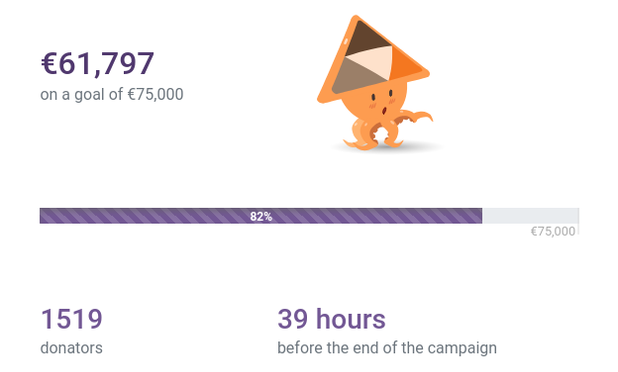Brandenburg hat geschafft woran Deutschland mit Hochdruck arbeitet. Alle Pullfaktoren für Tourismus, Migration oder internationalem Austausch von Fachkräften wurden beseitigt. Als einziges Bundesland leided Brandengurg nicht mehr an illegalem ungeregeltem Massentourismus. Jetzt kann sich die Wirtschaft endlich auf ihre lokalen Stärken konzentrieren: Das Einlegen von Gurken.
🇪🇺🏳️🌈 home automation, e-mobility, renewable energy, Moto Guzzi California
Not being federated and E2E as an advantage
https://revolt.chat/ is a chat that ultimately tries to emulate and displace Discord as an alternative.
Revolt is not E2E encrypted and not federated. That is a big plus.
Federation and E2E encryption are features that make an implementation much, much more complicated without need. Most people do not want to organize a women's shelter or abortion support or the antifash resistance. They just want to have a public guild server for their gaming guild or chat about 3D printers.
Don't federate chat
Having a federated system for that has a number of implications that make implementations more complicated and impact quality of life for users.
In a federated systems, different servers can be on different versions of the server software. This can impact features, which may or may not work properly. If will affect security of the whole network due to lack of patches in one place. And it will create propagation delays of messages inside the federated network, that is, order or even availability of messages can differ depending on what server in the federated network you are on.
As a consequence for the individual user, there is no single history order of messages – some messages may be missing, appear out of order, and there will be spam. Lots of it.
Back when Google Hangouts was still federating XMPP (Jabber) servers, specialized Jabber server implementations existed with the sole purpose of simulating user profiles, discovering Hangouts that are joinable, and spamming users with, well, garbage.
Operating a public chat room in 2025 is already a moderation nightmare. Adding federation is a surefire way to make things fail.
Federate identity, multihome clients.
This is not to say that the client should be bound to a single server.
It can, and should, in fact, connect to different servers for each community. The server, though, should be a "single visible instance, single history for all" thing, and have proper controls for the moderation team to control admission of new users to whatever their policy is.
EDIT: And, obviously, federated identity can be quite useful.
In fact, even Mastodon and other Fediverse systems should use federated identity, and also be identity servers. This will allow me to connect my client to a chat server without making any new account.
Don't E2E encrypt chat
Use TLS (or even a REST protocol over HTTPS) to connect to the chat server. But do not E2E messages.
Keep a clear text history on the server.
This makes it trivial for a single identity ("isotopp") to have multiple devices (desktop, ipad and web client) and switch between them, yet have the same chat history on all devices.
It will allow new users to join a channel and see the full channel history, if the channel is configured to do that (and because the server is not federated, the channel backlog policy can actually be enforced).
It makes it trivial to implement search and indexed archives for a server that wants that.
It makes it easier to implement detection of spammy behavior, implement rate limits, and to autodetect inappropriate or banned content.
With E2E, the server only has binary garbage that it cannot read itself, only distribute. It may not even have metadata.
It will be complicated to scan messages for spammy behavior, detect banned content.
It will be impossible to provide backlog to newly joined users. An existing identity (Isotopp) adding a new device (his phone) can only have backlog, if the other clients (the desktop of ipad client of Isotopp) of that user support client-to-client backlog transfer.
Without E2E encryption, there is no keysplit problem ("half a channel only sees undecipherable messages"), there is no "known plaintext" problem to handle, and there is no large-scale key distribution problem.
Conclusion
That is, a project that
- uses TLS, but not E2E, and
- that uses multi-homed clients but not federation,
will be able to build a better client with better UX with less effort and be a lot more agile.
Both properties (federation, E2E) do little for the end user experience except in a few limited use-cases, but come with a huge cost in implementation complexity, review and anti-abuse measures that will ultimately bind the majority of your dev capacity for nothing in return.
kann man nicht häufig genug dran erinnern. #bürokalender #weisheiten
Weil hier gerade die Bekämpfung von Mobbying Thema ist:
Die @BarbaraKaufmann hat mich an die (zumindest bei jüngeren Kindern) vielversprechendste Methode erinnert, wie man Mobbying abdrehen kann.
Der "No Blame Approach":
https://www.derstandard.at/story/3000000189903/die-anti-mobbing-methode-no-blame-approach-macht-den-boesewicht-zum-helfer
Obwohl wir wissen, dass Veränderung unausweichlich ist, tun wir so, als ob wir mit unserem normalen Alltag immer weiter machen können.
Hypernormalisierung | Kommentar – Leben in der kollektiven Verdrängung
https://share.deutschlandradio.de/dlf-audiothek-audio-teilen.html?audio_id=dira_BC661ECA487D11F07AF848DF3755BF60
#klimakrise
Das größte Problem bei einem AfD-Verbotsverfahren ist ja nicht der Antrag, das Verfahren oder die Beweise.
Die Hauptschwierigkeit besteht ja darin, die Sache so zu organisieren, daß die Begründung am Ende nicht dazu verwendet werden kann, die CDU gleich mit weg zu hauen.
Wenn wir doch bloß ein @bmv hätten, dass seine Arbeit machen würde. Dann hätten wir ein leistungsfähiges Schienennetz welches ganz Europa bei der Logistik unterstützt statt auszubremsen und auf den Autobahnen währe sogar noch Platz.
Hach.
Hamwer aber nich.
Schöne Scheiße.
We've achieved the 3rd goal of our crowdfunding campaign for the #PeerTube mobile app! 🥳
Thanks to your donations, we will be able to develop a live broadcasting feature within the app!
Thank you very much! 🥰
Der Möbelhaus-Werbeslogan WIR HABEN IHRE KÜCHE! weckt in mir eher Angst vor Lösegeldforderungen als Neugier auf das Sortiment.
I would like to be Chrisjen Avasarala: impeccably-dressed, running things, swearing like a sailor.
But I am Camina Drummer: barely keeping it together, sort of in charge, with a lot of complicated relationships and a strong eyeliner game.
Anzahl ehemaliger NSDAP Mitglieder im Bundestag. #Entnazifizierung.
Hab meinem Lehrer erklärt, dass Null mehr ist als Eins.
Es heißt ja EIN Löwe, aber NULL Löwen, also Mehrzahl.
Ja, so hat er auch geguckt.
Wenn jemand mal in Erbach im Odenwald sein sollte. HOLT KIRSCHEN! schreibt mich an für Adresse, es sind unfassbar viele Kirschen. Kletterkenntnisse müssen vorhanden sein, wir haften weder für Knochenbrüche, vorzeitiges Ableben oder Hirnparasiten (wer weiß was sich da in dem Baum rumtreibt). Kommt vorbei und holt Kirschen!
More than 46,000 internet-facing Grafana instances remain unpatched and exposed to a client-side open redirect vulnerability that allows executing a malicious plugin and account takeover.
In der CDU verstehen sie nach wie vor nicht, wo eigentlich das Problem ist. Spahn hat ja nur das gemacht, wozu CDU-ler überhaupt in die Politik gehen.
Pro tip for repairing things with #3dprinting: flatbed scanners! You probably still have one somewhere, they allow for precise measurements of complex geometries, and can usually fit larger objects than your printer. It often works even if the bottom surface isn't perfectly flat. Most of them shine light from the side, so rotating objects to get better contrast may help.
Wir hatten ja auf dem Congress schon abgefahrene Kunstinstallationen. Doch das hier ist echt der Hammer, was ich da heute im #Sprengel Museum in #Hannover sehen durfte. 😅
Die greifen die Daten der Bewegungssensoren einer echten Boje auf dem Meer ab und bilden das über die im Raum hängende Boje ab. 😅
Der Künstler heißt Julius von Bismarck.
Die Kunstinstallation wurde dieses Jahr im Sprengel Museum installiert.
Der erste Tag war toll. Heute, Samstag, 14. Juni, geht es weiter im @57nord in #Offenbach mit fiktionalen #Kurzfilmen und Animationsfilmen aus #RheinMain, #Portugal und #Brasilien.
20h30 – Ankommen und Essen!
21h30 – Block 1: Animationsfilm
22h00 – Block 2: Fiktional I + Q&A
22h30 – Block 3: Fiktional II + Q&A
23h30 – Ausklang, Austausch, Chill & Musikvideos
Der Eintritt ist frei. Die Getränke und das #Gaspacho stehen kalt! Hier geht's zum Programm: https://www.lusofest.de/sommershortssa2025










